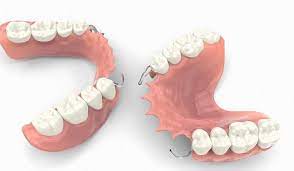
Understanding Partial Dentures: A Solution for Missing Teeth
Partial dentures are a removable dental appliance designed to replace multiple missing teeth while preserving the remaining natural teeth. They help restore function, improve aesthetics, and prevent oral health issues caused by tooth loss. If your dentist has recommended partial dentures, learning about their benefits and care can help you feel more confident in your treatment choice.
Why Are Partial Dentures Needed?
Partial dentures serve several essential purposes, including:
Restoring Chewing Ability – Missing teeth can make it difficult to chew properly, limiting your diet. Partial dentures help restore normal function for better nutrition.
Improving Speech – Gaps in your teeth can affect pronunciation. Partial dentures support clear and natural speech.
Maintaining Facial Structure – Tooth loss can lead to facial sagging. Partial dentures help maintain the natural contours of your face.
Preventing Shifting of Natural Teeth – When teeth are missing, the remaining teeth can shift into the empty spaces, causing misalignment. Partial dentures help keep teeth in their proper position.
Enhancing Confidence and Appearance – A well-fitted set of partial dentures can restore a natural-looking smile, boosting self-esteem and social interactions.
Types of Partial Dentures
There are different types of partial dentures, depending on the materials used and how they are designed:
Cast Metal Partial Dentures – These are durable, lightweight, and provide a precise fit. They use metal clasps or attachments to secure onto natural teeth.
Acrylic Partial Dentures – These are typically more affordable and used as a temporary or immediate solution while waiting for a more permanent restoration.
Flexible Partial Dentures – Made of lightweight, flexible material, these provide a comfortable and natural-looking option without metal clasps.
Implant-Supported Partial Dentures – These are anchored to dental implants, offering improved stability and function.
The Partial Denture Process
Getting partial dentures typically involves multiple steps to ensure a comfortable and effective fit:
Consultation and Examination – Your dentist evaluates your oral health and discusses the best denture option for you.
Impressions and Measurements – Molds of your mouth are taken to create customized dentures.
Trial Fitting – A temporary model is tested for fit, comfort, and appearance.
Final Denture Placement – The completed dentures are adjusted and fitted securely.
Follow-Up Appointments – Additional adjustments may be necessary to enhance comfort and functionality.
Caring for Your Partial Dentures
Proper maintenance extends the lifespan of your partial dentures and promotes oral health:
Clean your dentures daily with a soft brush and mild denture cleaner.
Remove and soak them overnight in water or a denture solution to prevent drying.
Brush your natural teeth, gums, and tongue to maintain oral hygiene.
Avoid biting into hard foods that may damage the dentures.
Visit your dentist regularly for check-ups and necessary adjustments.
Conclusion
Partial dentures are an effective and affordable solution for replacing missing teeth, restoring both function and aesthetics. If you are considering partial dentures, consult your dentist to explore the best options for your needs. With proper care, they can provide long-lasting benefits and a confident smile.
